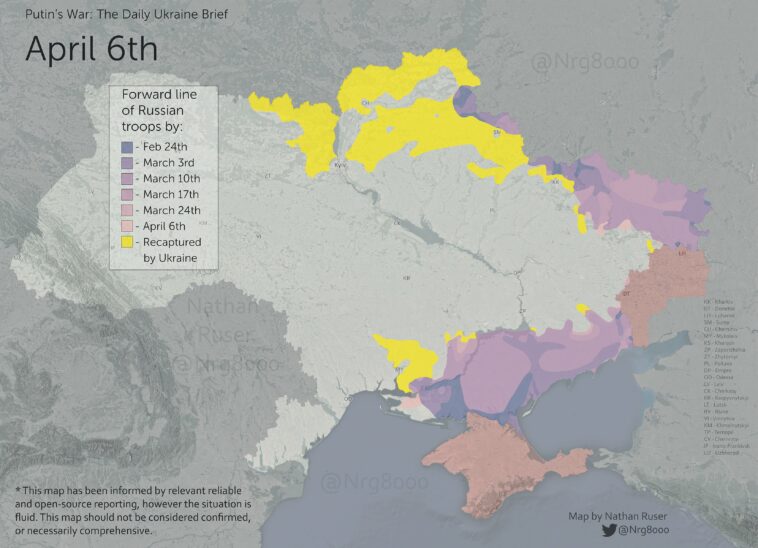Russia deploys mobile crematoria in Mariupol. The international spotlight on the Bucha massacre made Russia deploy mobile crematoria in Mariupol to incinerate the corpses of murdered civilians, the Mariupol city council said.
“Given the dimensions of the city, catastrophic ruins, long time under siege, and fierce resistance, there could be tens of thousands of civilian victims of Russia’s occupation troops in Mariupol. That is why Russia is in no hurry to give the green light to the Turkish mission and other initiatives to save and fully evacuate Mariupol,” a statement by the city council reads.
Russia is said to have deployed brigades of local residents and “DPR” members to burn the corpses in mobile crematoria. It is not possible to check the reports as the city is cut off.
Come Back Alive delivers military aid to Mariupol. The team of a Ukrainian charity fund said they managed to deliver thermal imaging cameras, drones, and portable chargers to the Ukrainian troops in Mariupol.
“Our whole team cries tears of joy. We believe that the city and its people will stand and win. They will show the occupying troops Ukrainian ire. Our team successfully delivered thermal imaging cameras, drones, and portable chargers to Mariupol’s defenders. Mariupol, servicemen and servicewomen who defend the city, entire Ukraine is with you! These are not just words. You are our heroes,” a statement by the charity fund reads.
Ten new sets of sanctions on Russia. In the past three days, Ukraine’s Western partners responded with ten fresh set of sanctions on Russia’s economy, financial system, trade, and on what’s left of Russia’s impact abroad. The U.S., the UK, the EU and G7 announced a ban on new investment in Russia. The U.S. imposed new sanctions on Russia’s largest banks Alfa-Bank and Sberbank. The U.S. has fully blocked more than two-thirds of the Russian banking industry. The U.S. sanctioned Putin’s daughters, Sergei Lavrov’s wife and daughter, Mikhail Mishustin, Dmitriy Medvedev and a number of members of Russia’s Security Council.
The UK froze the assets of Credit Bank of Moscow, and sanctioned Russian oligarchs Rotenberg and Mikhelson. Eighteen countries (Poland, Romania, Slovenia, Greece, Portugal, Estonia, Latvia, the Czech Republic, the Netherlands, Belgium, Ireland, North Macedonia, Luxembourg, Italy, Germany, France, Sweden, and Denmark) expelled a total of 318 Russian diplomats.
The Netherlands impounded 14 Russian-owned yachts. Denmark froze USD 11.8 worth of assets of Russian nationals.
The U.S. Treasury halted dollar debt payments from Russia’s accounts at U.S. banks. Today, Russia was not able to make a dollar debt payment for the first time. It is headed toward default. The U.S. blocks Russia’s largest state-owned companies, the list will be released tomorrow.
“Together with our friends we made EU’s fifth package of sanctions much stronger than planned,” Ukraine’s Foreign Minister Dmytro Kuleba said. “[It includes] an import ban on coal from Russia, worth EUR four billion per year, a full transaction ban on four key Russian banks, among them VTB, (the banks cut off from markets represent 23% of Russia’s market share), a ban on Russian vessels and Russian-operated vessels from accessing EU ports, a ban on Russian and Belarusian road transport operators that will drastically limit options for the Russian industry to obtain key goods, further targeted export bans, worth EUR 10 billion, in areas in which Russia is vulnerable (quantum computers and advanced semiconductors, but also sensitive machinery and transportation equipment).”
“I thank our partners for these decisions. Yet to avert ‘new Buchas’ and more suffering, we should not stop. Massive diplomatic fighting rages. We fight for a full embargo of Russian gas, oil, and coal (we are winning on coal and fighting for oil). We fight to ban Russian ships and goods from entering ports (we are winning in the EU, more news to come). We fight to remove all Russian banks from SWIFT.”
Ukraine in Flames #27. War in Ukraine: what does Russia really want?
Today is the 42nd day of Ukraine’s heroic defense against the Russian invasion. The world is already seeing the atrocities committed by the Russian army on the territory of Ukraine, war crimes and, at the same time, the will of Ukrainians to victory and peace.
From the very beginning of the full-scale invasion of Ukraine, Putin said that the goal of the so-called “special military operation” was to “denationalize”, “demilitarize” and “neutralize” Ukraine. And he hoped for a blitzkrieg, which should allow to occupy Ukraine in 2-3 days. Moscow has even developed models of state military awards “for the capture of Kyiv (Lviv) …”.
However, the rhetoric of official Moscow has changed as a result of a series of defeats in Ukraine – now their focus is on the “liberation of Donbass.” But what about “denazification”?
A few days ago, the author’s column by Timofey Sergeytsev “What Russia should do with Ukraine” was published on the website of the state agency RIA Novosti. In it, the author describes how, in his opinion, it is necessary to “denazify” the neighboring country. Here are just a few quotes from this “work”: “Apart from the top, a large part of the people who are passive Nazis are guilty. They supported and indulged the Nazi government. A just punishment of this part of the population is possible only as an inevitable burden of just war.” “Ukrainism – an artificial anti-Russian construction”, “Tragedies and dramas of wartime benefit peoples who have been tempted and fascinated by the role of Russia’s enemy”. This article opens the curtain on Putin’s true interests in Ukraine. However, this is only part of a big puzzle called “Putinism”.
So what does Putin really want in Ukraine? We will find out in this issue.
Speakers:
Vitaliy Portnikov, Ukrainian journalist and publicist
Ivanna Klympush-Tsyntsadze, Ukrainian MP
Maksym Vikhrov, journalist, editor of “Ukrainian Week” magazine
Oleksandr Kodola, mayor of Nizhyn, Chernihiv Oblast
Iurii Bova, mayor Trostianets, Sumy Oblast




